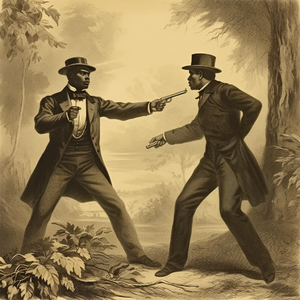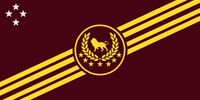Duel of 1892
 An artists rendition of the duel between Howard and Johnson that depicts Howard's inability to draw his pistol in time. | |
| Date | April 8th, 1892 |
|---|---|
| Location | Harlem, Mwindo, Unified Sera |
| Also known as | The Last Duel |
| Type | Homocide, Duel |
| Cause | Political Rivalry |
| Participants |
|
| Deaths | 1: Prime Minister Kwame Howard (at scene) |
| Charges | Johnson: Homocide (dismissed) Involuntary/Reckless Manslaughter (Guilty) |
| Trial | July 8th, 1892 |
| Sentence | Johnson: 8 years in Prison $500.00 in fines ($15,359.95 today) |
| Weapons | Pistols |
The Duel of 1892, also sometimes known as the Last Great Duel, was a duel between Prime Minister Howard and his one-time friend Martin Johnson. The duel was fought on the outskirts of Harlem after a grueling campaign wherein which both men ran for the position of Prime Minister. The campaign, debates, and mud slinging that ensued - in conjunction with Johnson bankrupting himself to finance it - culminated in the challenge being issued after his defeat in the election of 1889.
Background
Kwame G. Howard and Martin A. Johnson forged a deep bond of friendship in their early twenties, sharing a common vision of a prosperous and unified country. Initially their beliefs aligned greatly in the realm of social justice and political reform. They were both driven individuals with a fervent dedication to public service, believing in the power of politics to effect meaningful change in society. As they climbed the ranks of the political landscape, their friendship only grew stronger, solidifying their commitment to their shared ideals. This friendship even culminated in several political ventures where both men ran for office while being the second to the other.
By the time the men reached their 40s, they began to drift politically, but their friendship remained stable for the most part. Although both started as liberals and part of the Latinius Liberal Party, Johnson switched to the Sakhile Libertarian Party in 1887.[1] Throughout their intertwined careers, Howard and Johnson became prominent figures within their respective political parties. Howard namely, became Chairman of the Libertarian Party and helped jumpstart many famous politicians in Seran history. Howard made himself irreplaceable in the Liberal party and quickly positioned himself at the forefront of liberal politics. They were known for their eloquence, charisma, and unwavering determination to their country. Their collaboration in various political campaigns and causes cemented their reputation as effective leaders and strategists within their party and nationally.
However, as they ascended the ranks, the pressures of politics began to strain their once-close bond. The competition for power and influence within Unified Sera's political arena intensified, creating rifts between former allies. While Howard managed to secure crucial endorsements and support, Johnson faced setbacks that left him increasingly disillusioned and embittered. Members of Johnson's own party were wary of supporting the young man for higher office as he already "held the keys" to the party as a whole and the careers of other Libertarians in the country.
Howard, inversely, had run for several positions throughout his political career on the platform of progressivism and social reforms; namely reforms of the caste system used in the country and the amount of power given to the states over the federal government.[2] Howard was able to secure the support of the Liberal party and managed to snag a seat in the House of Deputies and later, a seat in the Senate; a position long sought after by Johnson. The turning point in their relationship came during the election of 1889. Both Howard and Johnson harbored aspirations for the position, seeing it as a crucial platform to enact their visions for Unified Sera. As the campaign progressed, tensions escalated between the two friends, fueled by personal ambitions and ideological differences. What had once been a partnership marked by shared goals now became a battleground for their competing visions of governance.[3]
The campaign trail witnessed intense debates, public rallies, and rigorous policy discussions as Howard and Johnson aimed to sway voters to their respective causes. The campaign for the position was fraught with persistent personal attacks and hate-filled rhetoric; the messaging from both men including secrets and personal details that they learned over the years of their friendship. Mud slinging became commonplace as the election loomed ever closer. Their passionate rhetoric and eloquent speeches both captivated and enraged audiences, stirring emotions and inspiring both admiration and fierce criticism. The nation was divided, with supporters of Howard and Johnson engaging in passionate debates or heated bar brawls, further exacerbating the growing divide between the two one-time friends.
Ultimately, the election day arrived, and the citizens of Unified Sera turned out to cast their votes. The competition was fierce, with each candidate rallying their supporters until the last possible moment. The nation held its breath as the results were announced, revealing Howard as the victor of the election, securing the position of Prime Minister.
The defeat was a significant blow to Johnson, who had invested considerable effort, time, and personal aspirations into his campaign. Johnson even bankrupted himself in order to pay the ever increasing costs of campaigning in the hopes of defeating Howard.[4] The sense of loss and disappointment he experienced in the aftermath of the election sowed the seeds of resentment and bitterness, further straining his relationship with Howard and setting the stage for the tragic events that would follow.
Johnson, consumed by wounded pride and a longing to restore his honor, firmly believed that the only way to regain his sense of dignity and reputation was through a duel with Howard. The code of honor prevalent in the political and social circles of the time dictated that disputes of this nature could only be resolved through personal combat. Johnson, now estranged from his former friend, saw the duel as the ultimate test of their honor and a chance to redeem himself in the eyes of his peers.
Thus, on that fateful day in April 1892, Martin Johnson challenged Kwame Howard to the ill-fated duel. What had once been a friendship built on shared dreams and camaraderie had now transformed into a bitter rivalry, and the honor they had once upheld became a battleground for their personal grievances. The stage was set for a tragic clash that would forever alter the course of Unified Sera's history.
The Duel
"I stand before you, not as a rival seeking power or glory, but as a man wronged, wounded in the depths of his honor by your calculated machinations. From the pinnacle of our shared dreams, you have cast me aside, trampled upon the bonds we once held dear. Your insidious maneuvering, shrouded in cunning words and sly gestures, has sown discord and shattered the harmony we once cherished. Not even all of the fiends of the afterlife come near your debauchery and treachery. I demand satisfaction..."[5]
| This article is part of a series on the |
| History of the United States of Sera |
|---|
 |
On April 8th, 1892, the nation bore witness to the Duel of 1892 between Prime Minister Howard and his former friend, Martin Johnson. The duel, fought with pistols as was selected by the challenged, was the culmination of mounting political tensions, personal grievances, and a clash of honor. The chosen location for the duel was a secluded field on the outskirts of Harlem, Mwindo. As the designated time approached, a small group of witnesses were selected to view the events and report on the authenticity after the fact. Both Howard and Johnson's seconds met in the center of the field to discuss possible ways that the duel itself could be avoided. However, despite these attempts, the Seconds came away with no agreement and thus the duel was to commence. The seconds—trusted individuals tasked with ensuring the duel's fairness and adherence to the code of honor—meticulously inspected the firearms, and ensured their proper functionality.
At the signal to commence, Howard and Johnson simultaneously took 10 paces, and after a 3-count, were to draw their pistols, turn, and fire a single shot each. After the paces and the final count, both men turned to fire, however Kwame was unable to free his pistol from its holster, and subsequently was shot between the third and fourth rib by Johnson. [6] Immediately, chaos and panic is said to have engulfed the scene. The seconds and witnesses rushed to Howard's side, and desperately attempted to provide aid. The wound proved fatal, and the Prime Minister would die at the scene "mere moments" after the gunshot.
Aftermath and Legacy
The aftermath of the duel was one of shock, grief, and confusion throughout the nation. The loss of Kwame G. Howard, a beloved leader and symbol of unity, was deeply felt by the citizenry. The tragic circumstances of his death intensified by the shortness of his time in office.
"The Duel of 1892 not only claimed the life of a remarkable statesman but also brought to the forefront the inherent dangers and flaws of dueling as a means of resolving conflicts. We claim ourselves to be better than the unwashed savages beyond our borders, and yet our own leader lies dead as a result of senseless violence." [7]
In the aftermath of the duel, the practice of dueling landed squarely in the sights of Parliament. Mere weeks after the conclusion of the duel, Parliament passed laws banning the act of dueling or participating in duels illegal in Sera and her territories. The tragic outcome and the recognition of its inherent risks compelled the authorities to eliminate this form of settling disputes from the nation's legal and social fabric. The ban on dueling stood as a testament to the recognition that personal honor and grievances should be addressed through more peaceful and rational means.
Martin A. Johnson, despite being victorious in the duel, faced severe consequences for his actions. Following the events, Johnson was escorted to safety after his home was vandalized by supporters of Howard whose goal was to kill the perpetrator. Yet, shortly after his rescue, he was promptly arrested by the authorities and charged with Homocide and Treason.[8] The trial that ensued captivated the nation, as it sought to determine the culpability of a man whose life had become intertwined with the downfall of Prime Minister Howard. During the trial, Johnson's defense submitted a not-guilty plea on all charges and argued that the duel had been initiated by two consenting adults and the result of which was completely understood by both parties, a matter of honor rather than premeditated murder.[9]
They presented evidence and testimonies to support the contention that Johnson's intention had not been to kill, but rather to seek retribution for perceived slights and restore his damaged honor. The death of the Prime Minister an unintended - albeit understood probability - outcome. During the trial it was stressed that the duel was not about assassinating the Prime Minister but rather re-obtaining honor lost during the campaign.[10] This defense was especially important to Johnson's team as a guilty verdict for the charge of Treason had the high probability - especially in the case of the killing of a statesman - of carrying the death penalty.
Ultimately, the jury rendered a verdict of not guilty of homicide and not guilty of Treason, accepting the defense's argument that the duel had been a tragic accident rather than a deliberate act of violence. However, the jury did find Johnson guilty of Involuntary Manslaughter as he understood the risks associated with dueling, and yet he proceeded with the act in spite of the possibility of death or serious bodily harm. He was sentenced to 8 years in prison and $500.00 ($15,359.95 today) in fines.
Of his 8 year sentence, Johnson served only 3, and was released on good behavior. Shortly thereafter he disappeared from the public eye.
Parliament used this event as justification to establish the Office of National Intelligence and the creation of the Bureau of State Security (BSS) under AEGIS which now protect the Prime Minster, diplomats, high ranking military personnel, and members of Parliament.[11]
References
- ↑ Smith, John. "The Rise of Kwame G. Howard and Martin A. Johnson: A Political Friendship." Journal of Unified Sera Politics 45, no. 2 (2018): 87-105.
- ↑ Howard, Kwame G. "Politics and Principles: A Manifesto for a Progressive Unified Sera." Unified Sera Gazette, April 1892.
- ↑ Thompson, Sarah. "Ambition and Rivalry: Exploring the Fractured Friendship of Howard and Johnson." Political Dynamics Quarterly 72, no. 3 (2019): 221-240.
- ↑ Unified Sera Historical Society. "Election of 1889: Competing Visions for Prime Minister." Unified Sera Chronicles 29, no. 4 (2005): 125-183.
- ↑ Johnson, Martin A. "Letter to Kwame G. Howard: A Challenge to Honor." Personal Correspondence Collection. Unified Sera Archives, 1892.
- ↑ Williams, Emily. "The Code of Honor and Dueling in Unified Sera's Political Circles." Social Customs in Unified Sera: Insights into the Past. Edited by Michael Johnson, 105-128. Takhar University Press, 2010.
- ↑ Kobe, Lamar. "The Death of a Great is Never Great". Unified Sera Archives, 1893.
- ↑ Thompson, David. "Repercussions of the Duel: Outlawing the Practice and Its Impact on Society." Cultural Shifts in Unified Sera: Exploring the Aftermath of the Duel. Edited by Lisa Adams, 235-259. Unified Sera University Press, 2007.
- ↑ Johnson, Martin A. "Statement of Innocence: A Plea for Justice." Defense Document, April 1892.
- ↑ National Archive of Unified Sera. "Legal Proceedings: The Trial of Martin A. Johnson." Case File No. 1892/107. Unified Sera National Archive, 1892.
- ↑ Turner, Elizabeth. "The Impact of the Duel of 1892 on Public Perception of Dueling." Cultural Perspectives in Unified Sera, edited by Robert Adams, 78-94. Unified Sera Publishing, 1998.


